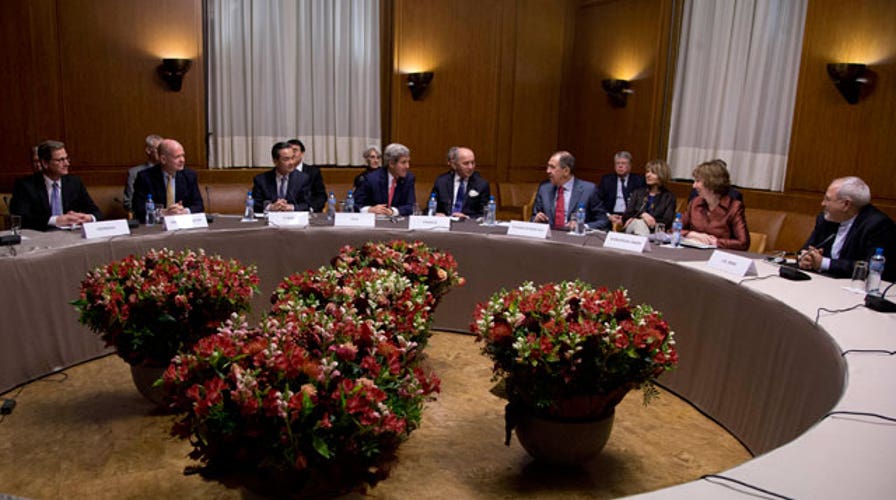Nuke deal with Iran: Historic agreement or historic mistake?
Reaction from Amb. Nicholas Burns
There are mixed global reactions to the interim deal struck between the P5+1 and the Iranian regime in Geneva this weekend. Some are celebrating and others are skeptical about the six-month arrangement brokered between the UN Security Council diplomats and Iran’s government, but it appears there are two obvious winners and two losers.
It’s clear who the winners are, as the foreign diplomats and Iranian leaders walked away from Geneva with their heads held high, offering their constituencies press conferences and self-congratulatory Tweets on Twitter. And among the leaders, the Americans and Iranians, the two main victors, could not be happier, albeit for different reasons.
Winner #1: President Obama and Secretary of State Kerry
President Obama and Secretary Kerry were out to get a deal. It didn’t happen the first two times the Security Council met, but it was bound to happen, even if, as the cliché was sounded around the world, a bad deal would be favored over no deal at all.
[pullquote]
An Iran deal for the White House, even one without genuine results, means a foreign policy legacy for both Obama and Kerry. It means a break from failed domestic policies back home and a chance to flex American diplomatic muscles in the Middle East.
Since an Israeli/Palestinian peace accord is far off at this point, why not score an Iranian victory if the other side has come to the table? For the Obama administration, all Middle East victories are created equal and since we have lost the chance in Egypt, Syria and Libya, this is the best bet.
Winner #2: The Iranian regime
The biggest winner in this deal however, is the Iranian regime who scored vital gains in exchange for symbolic concessions.
The Iranian regime came to the negotiating table not because it is now filled with ‘moderates.’ They came to get economic relief and to give up as little as possible, with the precondition that they would not give up the right to enrich uranium. And that’s exactly what they walked away with and more.
They also gained time. They now have another six months to work and enrich their program, which according to many experts, is only six months to a year away from completion.
They scored legitimacy. They came to Geneva, met with diplomats representing the world community and were dealt with and respected as members of the same.
They were not questioned about executions back at home. They weren’t criticized for their support of global terrorism. They weren’t asked about their continued support of Bashir al-Assad’s blood bath in Syria.
The U.S. didn’t even ask about our Americans -- Pastor Saeed Abedini and Amir Hekmati -- held in Iranian prisons.
That was all swept away in exchange for shallow concessions to prove their nuclear program ‘peaceful’ and a promise to not expand their program over the next six months.
They got a pass for all of it.
But the biggest win for the Iranian regime was gaining significant relief from economic sanctions; a release of funds held and a chance to revive their shattered economy.
Although Secretary Kerry and President Obama both clearly said that the sanctions could and would be reversed should the regime not keep its end of the deal, the Iranian regime was only after some breathing room in order to continue business as usual back home and more importantly, to keep the Iranian people from a breaking point that would have demonstrators back on the street and threatening the mullah’s rule.
Loser #1: The Iranian people
When it comes to any deal with the Iranian regime, it is clearly the Iranian people who are the losers. While they are now getting a relief from sanctions, they are not getting any relief from a regime who has caused additional financial hardship on its people, masterfully transferring the burden of economic sanctions onto them.
Basic food items are astronomically expensive and vital pharmaceutical items are scarce. Instead of helping the people by providing subsidies, the Iranian regime has chosen to funnel its money into Syria to keep Bashar al Assad in power.
In an embattled economy, they continue to financially and otherwise prop Hezbollah forces and continue to be the globe’s number one exporter of terrorism.
It’s the Iranian people that must continue to live with daily social and political crackdowns, under a regime that has yet to prove itself ‘moderate.’
Iran’s prisons are filled with bloggers, journalists, political activists, gays, and others who may be executed at any moment without warning. Just since Rouhani took office in August, more than 200 of these prisoners have been executed.
Loser #2: Iran's neighbors
The second loser in these deals are Iran’s neighbors who have warned the West, and the U.S. in particular, about striking a poor deal with Iran. Now in the aftermath of this weekend’s deal, the Israelis and Saudis are most vocal about their respective concerns.
For Israel, this deal does not change its apprehension over an Iranian nuclear bomb.
Sunni-dominated Saudi Arabia, the longtime regional rival of the Iranian Shiite regime, has said it will not ‘sit idly by.’
The Saudis are worried about Iranian influence in the region in changing the geopolitical structure of the Middle East, particularly with its strong influences in Syria, Lebanon, Iraq and Bahrain.
Both winners and both losers will now have to wait to see how the regime in Tehran will act to prove its nuclear program peaceful over the next six months. In the meantime, funds will be released, but centrifuges will keep on spinning.

